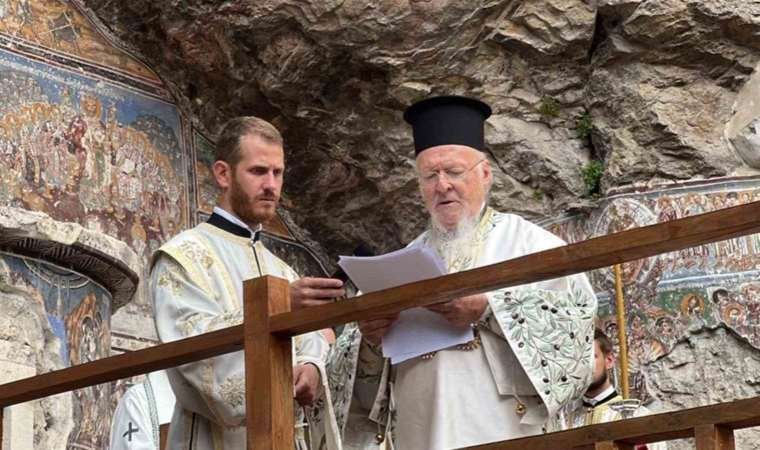Hundreds of Orthodox Christians gathered at the historic Sümela Monastery in Trabzon on Aug. 15 to observe the Divine Liturgy performed by the İstanbul-based Ecumenical Patriarch Bartholomew, drawing the ire of pro-government and opposition figures alike.
Earlier on Monday, Turkey’s nationalist opposition İYİ (Good) Party urged authorities to cancel the Divine Liturgy, citing a violation of the 1923 Treaty of Lausanne.
However, no such cancelation took place and Ecumenical Patriarch Bartholomew, the spiritual leader of Eastern Orthodox Christians globally, presided over the service in honor of the Orthodox feast of the Dormition of the Virgin Mary, attended by 350 people who came from Greece, Georgia and Russia.
Anastasios Bakasetas and Dimitrios Kourbelis, two players on the Greek national football team who play for the Trabzonspor football club, were also among the attendees.
“We commemorate our common value, Mother Mary, in whose name there is a chapter in the Holy Quran,” Patriarch Bartholomew said in a sermon to those present.
However, his calls for recognizing common values between Christians and Muslims did not resonate with some Turks, who viewed the ritual as a concession to the Greek government.
Trabzon- Sümelâ Manastırına âyin yapmak için gelen Yunanlı turistlerin tamamı Yunan İstihbaratının elâmanları olup, asıl maksatları âyin olmayıp, ‘’HAYALİ PONTUS DAVALARININ’’ propagandasını yaparak, Sümelâ üzerinden kirli davalarını dünya efkârına duyurmaktır. https://t.co/dmlTlNzVGj
— Metin KÜLÜNK (@mkulunk) August 14, 2023
Metin Külünk, a controversial figure and a close confidant of Turkish President Recep Tayyip Erdoğan, claimed that the attendees were working for “Greek intelligence,” and that the ritual was nothing more than “propaganda for the Pontic Greek cause.”
Following its conquest by the Ottomans in 1461, Trabzon, which was once predominantly Christian and Greek, experienced a gradual change in its demographics.
During the Turkish War of Independence, Christian Pontic Greek communities in the province rose up against the Turkish army led by Mustafa Kemal, the country’s founding father. Following a forced population exchange with Greece as stipulated in the Treaty of Lausanne, the Christian presence in the city ceased, although many Greek-speaking Muslims continued to reside there.
Bugün 15 Ağustos.
Fatih, 1461 yılında bugün Trabzon'u fethetti.
*
Bugün Sümela Manastırı'nda Patrik Bartholomeus âyin yapacak!
*
Trabzon'un fethedildiği gün böyle bir yerde ayin yapmak neyin nesidir? Meydan okumak değilse nedir bu?
Böyle bir şey aslâ kabul edilemez! pic.twitter.com/No6gymcGrq— yusuf kaplan (@yenisafakwriter) August 14, 2023
“Today is August 15. Fatih [Mehmet the Conqueror] conquered Trabzon today in 1461. Patriarch Bartholomeus will perform a ritual at the Sumela Monastery today! What is it like to hold a ritual in such a place on the day Trabzon was conquered? If that’s not a challenge, what is? Such a thing is totally unacceptable!” tweeted pro-government columnist Yusuf Kaplan.
Last year, authorities designated Aug. 15 as the day commemorating Trabzon’s conquest by the Ottomans. Prior to that, the celebrations were held on Oct. 26.
Lütfü Türkkan, a lawmaker from the İYİ Party, pointed to the Greek refusal of entry for the chairman of an association representing Turks in western Thrace and compared it to Turkey’s approval of the liturgy at Sümela.
“On the day that Turkey allowed to hold a service at Sümela Monastery, the president of the Western Thrace Association, Hasan Küçük, was turned away from the İpsala border gate in Greece, along with his family, without any justification. Is this what you understand by reciprocity in foreign policy?” Türkkan tweeted.
Turkish nationalists oppose the liturgy by invoking the “principle of reciprocity,” a legal principle that involves mirroring legal effects in situations where foreign countries also recognize those effects. Articles 37 to 44 of the Lausanne Treaty mandate that Turkey respect the rights of minorities and ensure their freedom of religion.
However, Article 45 states that Greece should grant the same rights to the Muslim minority within its borders. Citing this article, nationalists argue that since Greece does not permit an Islamic ritual in the Fethiye Mosque in Athens, Turkey should, in reciprocity, disallow such rituals in areas where Christian Greeks are not present in significant numbers.
Turks who advocate for the performance of the liturgy argue that human rights are inalienable and that international treaties should not impede them.
In Turkey Christians, as a minority group, experience various challenges and rights violations, according to the 2022 Report on International Religious Freedom released by the US Department of State. The 1923 Lausanne Treaty formally recognizes the rights of Armenian Apostolic Orthodox Christians, Jews and Greek Orthodox Christians. However, Christian denominations still find themselves grappling with limitations on their religious rights.
A significant point of contention has been the Greek Orthodox Halki Seminary’s prolonged closure. The seminary, affiliated with the Greek Orthodox Church, was shuttered in 1971 after the Turkish Parliament enacted legislation banning private institutions of higher education. Despite multiple international critiques and assurances from the Turkish government, the seminary remains closed, hampering the Greek Orthodox Church’s ability to train clergy domestically.
Earlier, Ecumenical Patriarch Bartholomew had responded to the criticism of the violation of the Lausanne Treaty by reminding that their rights recognized in Lausanne were not being protected by the Turkish authorities.

